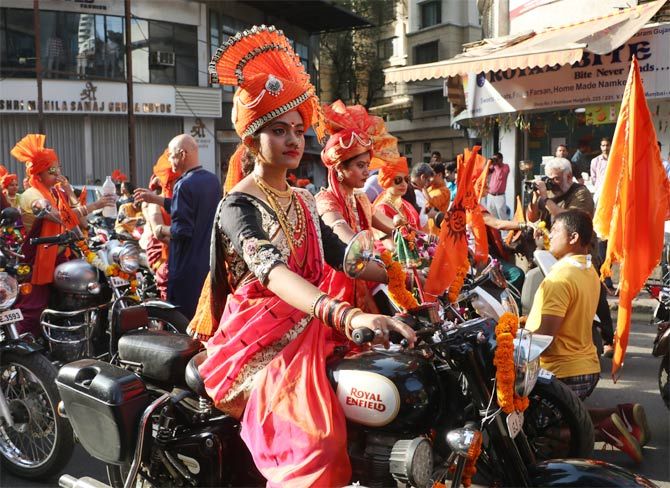Companies like Triumph, Harley Davidson, Ducati have a high cost structure limiting their sales. Bajaj sees an opportunity here.
The company believes Indian engineering skills will lower manufacturing costs and make a Triumph bike available to Indian customers at nearly a third of the current price!
Surajeet Das Gupta reports.

Photograph: Hitesh harisinghani/Rediff.com.
The segment the motorcycle industry calls 'sports value bikes' -- that is, bikes priced between ₹1 lakh and ₹2 lakh -- is not for the faint-hearted.
For one, this market accounts for just 6 per cent of the 12 million Indian motorcycle market.
For another, it is dominated by Eicher Motors' Royal Enfield with a 95 per cent market share. But Rajiv Bajaj, managing director, Bajaj Auto, has chosen to rev into this market.
A test ride via Bajaj's Austrian collaborator, KTM, of some bikes within this price range yielded monthly sales of over 1,000 units. So, in January this year, he made a more assertive foray with Dominar, a 373 CC offering priced at ₹1 lakh-plus.
Sales of the two bikes together so far haven't been bad -- at 6,500 units a month in India and overseas.
But despite its ambitious name, Dominar is a pygmy next to incumbent Enfield, whose various brands sell nearly 70,000 units a month.
To narrow the gap on his good friend Siddhartha Lal of Eicher, Bajaj took the battle to a new level by announcing a tie-up with the United Kingdom-based Triumph Motorcycles to manufacture mid-segment bikes in India, both for the domestic and export market.
The tie-up will develop and manufacture Triumph models at Bajaj's plant in Maharashtra and sell them in India and global markets where each partner has market presence.
The new model, which is being developed and designed in India, is expected to hit the market by 2020, for which Bajaj is exploring the possibility of making fresh investments in a separate manufacturing line.
Some models of Triumph are currently assembled and sold in India from a facility in Manesar. But at ₹5 lakh a unit, this market is minuscule: Between them, Triumph, Harley, and Ducati sell 6,000 to 7,000 bikes a year.
Bajaj's plan is to leverage Triumph's premium brand name with his company's frugal engineering skills: 'We plan to offer an aspirational, international bike at an affordable price and create a substantial new market segment.'
What does he mean?
Companies like Triumph, Harley Davidson or even Ducati (which is now up for sale) have a high cost structure limiting their sales, and they make little or no money. For instance, Triumph sells only 65,000 bikes annually across the globe, Harley Davidson around 260,000 and Ducati 55,000 a year.
Bajaj sees an opportunity here.
By using Indian frugal engineering skills, which include using some common components with other bikes that it sells or leveraging its existing facilities (for example, the paint shop of the best-selling Pulsar can be used for a Triumph bike), it hopes to lower manufacturing costs.
So, not only will Indian consumers get a Triumph bike at nearly a third of the current price, Bajaj reckons he can create a market segment globally, too. He estimates that the size of the global market could be as large as 1 million annually -- and that adds a ₹15,000-crore market for exports in the kitty.
Though the numbers look tempting enough, the strategy is not new.
Bajaj is merely replicating what it did with its alliance with KTM, the Austrian motorcycle company in which Bajaj Auto has a 49 per cent stake.
When it tied up, KTM sold 65,000 bikes annually and was confronted with high costs and low volumes. Today, KTM sells over 350,000 units annually, both in India and the global market.
The entry barriers to this business are also low. For instance, the success of the KTM-Bajaj business model has prompted even rival TVS group to tie the knot with premium bike maker BMW to do the same thing.
For Bajaj, however, the Triumph alliance is designed to strengthen its overall sports bike portfolio.
The Pulsar and the Avenger address the price-conscious consumer in the sports bike segment, the KTM brands (including the Husqvarna that KTM has licensed from BMW) the value and the premium end. Triumph with Dominar and KTM will strengthen the mid-range.
For Bajaj, perhaps, the real question is whether a cheaper Triumph can compete with the entrenched brand values of the Enfield Bullet, with its deep roots in Indian popular culture.
As a Bajaj Auto competitor points out: 'Why should consumers buy a Triumph, which has been watered down on various performance parameters to reduce price when they have the time-tested Enfield? The brand salience for Enfield is far higher than Triumph in the domestic market.'
Besides, Lal, CEO of Eicher Motor, has based himself in London to focus on global markets.
With the first Indian-made Triumphs due to hit the markets in three years, this could be the road race to watch.













 © 2025
© 2025